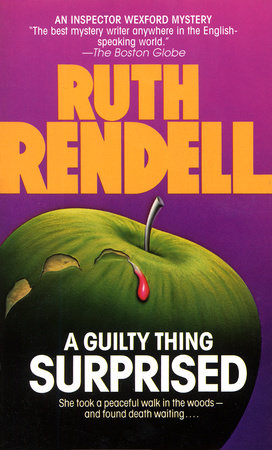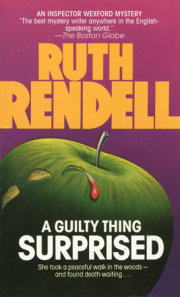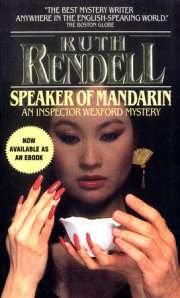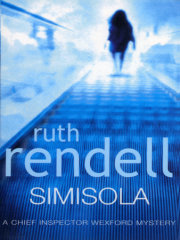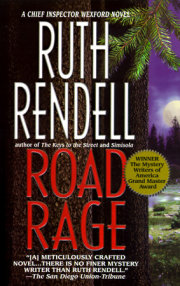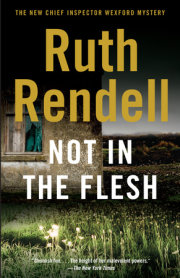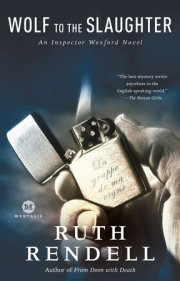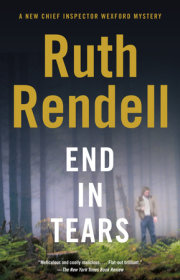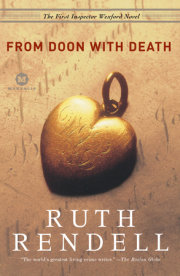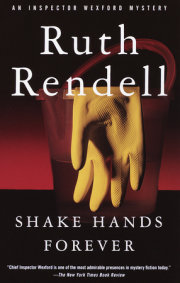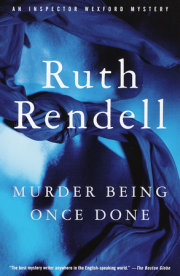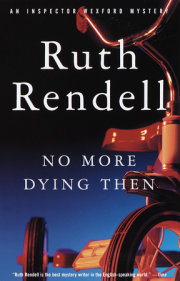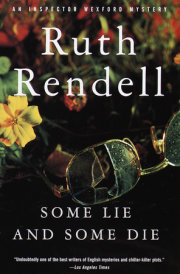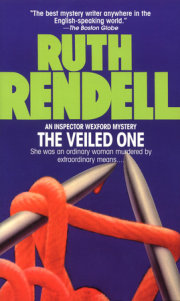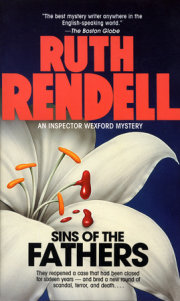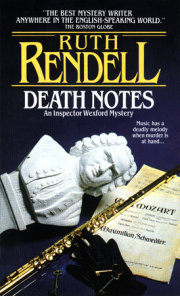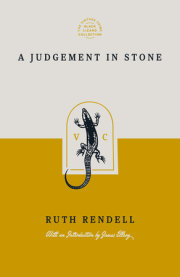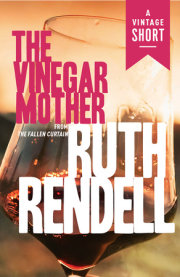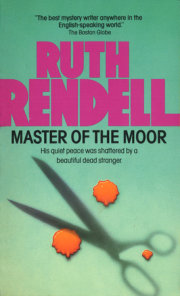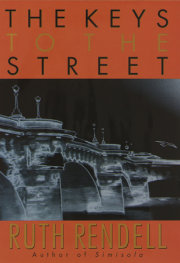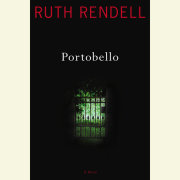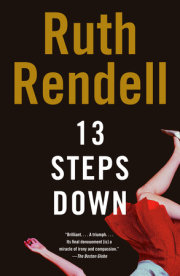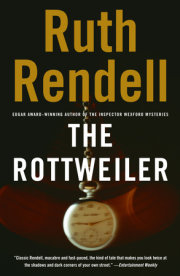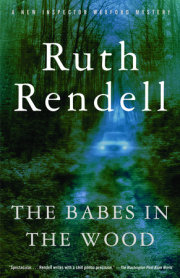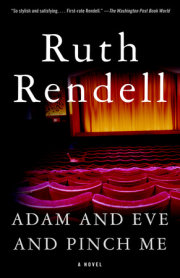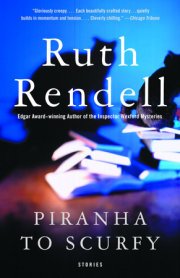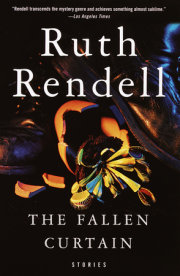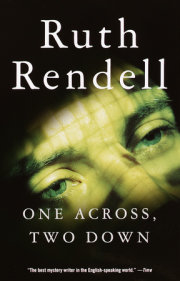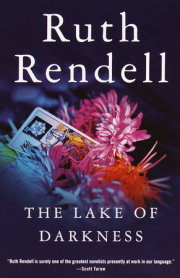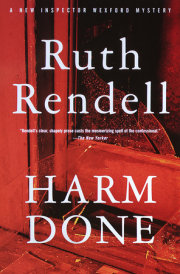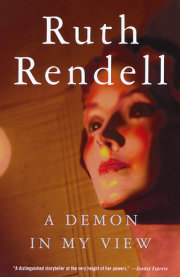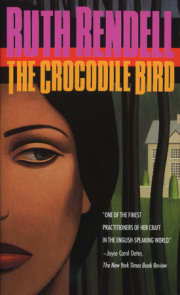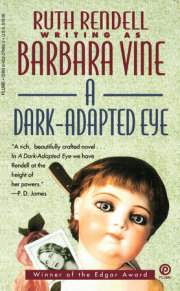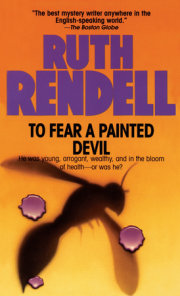1
When Quentin Nightingale left home for London each morning his wife was always still asleep. His housekeeper served him with breakfast, opened the front door for him and handed him his hat and his umbrella, while the au pair girl fetched his newspaper. Next to speed him on his way were the two gardeners, saluting him with a respectful ‘Good morning, sir’, then perhaps his brother-in-law, hurrying to the sequestered peace of his writer’s haven in the Old House. Only Elizabeth was missing, but if Quentin minded he never showed it. He walked briskly and confidently towards his car like a happy man.
On this particular morning in early September everything was just as usual except that Quentin didn’t need his umbrella. The gardens of Myfleet Manor lay half-veiled by a golden mist which promised a beautiful day. Quentin came down the stone steps from the front door and paused briefly in the shrubbery to remind Will Palmer that the incurved chrysanthemums they were nursing for Kingsmarkham flower show were due for a dose of liquid fertiliser. “Then he followed the path to the courtyard between the old coachhouses, where his car, its windscreen newly polished by Sean Lovell, stood waiting.
Quentin was a little early. Instead of getting into his car, he strolled to the low wall and looked down over the Kingsbrook Valley. The view never ceased to delight him. Hardly another house was visible, only the meadows, green, and, those that had been newly shorn, pale gold; the river winding through its thin sleeve of willows; the low round hills each topped with its ring of trees, and there, to his left, on the other side of the road, the great fir forest. It covered a whole range of hills and this morning in the mist it looked like a dark velvet cloak flung carelessly across the landscape. Quentin was always thinking of metaphors for the forest, comparing it to something, romanticising it. Sometimes he thought of it not as a forest or a velvet cloak but as a recumbent animal, guarding the fields while it slept, and of those irradiating plantations as spread, powerful and protective paws.
He turned his gaze to his own parkland, then to the nearer grounds, the sleek misted lawns and the massed roses whose colours were made pallid by haze, and he was just considering whether he should take a rose, an Iceberg perhaps or a Super Star, when a finger touched his shoulder and a cool voice said:
“To her fair works did Nature link
The human soul that through me ran;
And much it grieved my heart to think
What man has made of man.”
“Good morning, Denys,’ Quentin said heartily. ‘Not a very cheerful quotation to make on a lovely morning. Wordsworth, isn’t it?’
Denys Villiers nodded. ‘If I’m not cheerful,’ he said, ‘it must be because term begins in two days’ time and after that I shan’t get any more work done till Christmas. By the way, I’ve something for you.’ He opened his briefcase and brought out a book, new, glossy, evidently fresh from the binders. ‘An advance copy,’ he said. ‘I thought you might like it.”
“Quentin’s face lit with pleasure. He read the title: Wordsworth in Love by Denys Villiers and then with barely controlled excitement he turned to the dedication. This he read aloud. ‘ “For my brother-in-law Quentin Nightingale, a true friend and patron.” Ah, Denys, that’s wonderful! Makes me feel like Southampton.’
Villiers gave one of his crooked rare smiles. ‘The only begetter of these ensuing essays, Mr Q.N.…’ He frowned, as if at his own weakness. ‘As long as you like it. Well, as I have work to do and so do you …’
‘Yes, I must be off. Look after yourself, Denys. I shan’t be able to wait to get home and start on this.’ He tapped the book, patted Villiers’ shoulder and turned away. Villiers pushed open the door in the Old House wall and entered the shady court where limes and cypresses grew and where the sun never penetrated. Still smiling, his present on the seat beside him, Quentin drove away to London.
Elizabeth Nightingale spent an hour preparing herself for the eyes of the world. The effect aimed at was one of simple youth, spotless, fresh, lightly painted, dressed with casual precision or perhaps precise casualness. People said she looked no more than twenty-five. Ah, said Elizabeth to her reflection, but they didn’t know me when I was twenty-five! Sometimes she also said that nowadays it took her twice as long to look half as good.
Ever-democratic, she took her morning coffee with the staff in the kitchen. The two gardeners sat at either end of the table and Elizabeth sat opposite Katje Doorn. Mrs Cantrip drank her coffee standing up, issuing her orders.
“If you catch sight of that Alf Tawney, Will, mind you tell him I’ve a chicken ordered for tonight and I want it this morning, not five minutes before Madam’s dinner-time. Take your elbows off the table, young Sean. If I’ve told you once, I’ve told you fifty times. Now, Catcher, when you’ve drunk your coffee you can take Mr Villiers’ over to him. He’ll think we’re all dead and that’s a fact. And, for pity’s sake, turn off that radio. Madam doesn’t want to listen to that racket, I’m sure.’
‘Oh, but I like pop, Mrs Cantrip,’ said Elizabeth.
Sean lifted his head. ‘Only got to look at you,’ he said, ‘to see you’re no square.’
Shocked, Mrs Cantrip said, ‘That’s no way to talk to Madam!’
‘I take it as a great compliment,’ said Elizabeth.
Sean’s dark face flushed with pleasure and he smiled his pomegranate smile, showing even white teeth between red lips. Inspired by his employer’s encouragement, he eyed first Mrs Cantrip and then Will Palmer. Katje was giggling, but he ignored her. ‘You’re all the same, you oldies,’ he said, ‘stuck in the same old groove.’
‘Your groove’s gardening and don’t you forget it. You’ll never be one of them singers.”
“And why not?’ But Sean’s aggressive mood had changed to despair. ‘I’ll have to get cracking, I’ll just have to. I said to my old lady, Time’s getting on, I’ll be twenty-three come April. What would have happened if the Beatles had waited till they was twenty-three before making a start?’
‘What would have happened?’ said Mrs Cantrip. ‘The world’d have been a quieter place and that’s a fact.’
‘Never mind, Sean,’ said Elizabeth with her sweet smile. ‘You know what I’ve promised. I won’t forget.’ And Sean nodded eagerly, watching Elizabeth with rapt eyes. ‘Now, Will, there’s a suit Mr Nightingale’s finished with that might fit you. While I’m in the giving vein, I’ve packed up a little parcel for your mother, Katje. Suet and some of those biscuits she can’t get in Holland. You’ll find it on the hall table with a parcel of mine. Perhaps you’d take them to the post?’
‘Madam,’ said Mrs Cantrip when Elizabeth had gone, ‘is an angel. It’s a crying shame there aren’t more like her about.’
Katje giggled.
Copyright © 2012 by Ruth Rendell. All rights reserved. No part of this excerpt may be reproduced or reprinted without permission in writing from the publisher.

